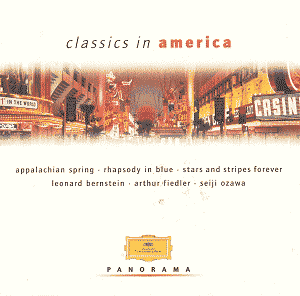CLASSICS IN AMERICA
George
GERSHWIN
Rhapsody in Blue (1), An American
in Paris (2)
Leonard BERNSTEIN
Symphonic Dances from "West Side Story" (3)
John Philip SOUSA
The Stars and Stripes Forever (4)
Charles IVES
Central Park in the Dark, The Unanswered Question (5)
Samuel BARBER
Adagio for Strings (6)
Aaron COPLAND
Appalachian Spring (7)
William RUSSO
The Pieces for Blues Band and Symphony Orchestra, op.50 (8)
Scott JOPLIN
The Entertainer, Sugar Cane Rag, Maple Leaf Rag (9), Treemonisha: We're
goin' around, Aunt Dinah has blowed the horn (10) |
 |
 Kenneth Hicks (tenor) (10),
Boston Pops Orchestra (4, 9), Houston Grand Opera Chorus and Orchestra (10),
Los Angeles Philharmonic Orchestra (1, 3, 6, 7), New York Philharmonic Orchestra
(5), San Francisco Symphony Orchestra (2, 8), Siegel-Schwall Band (8)/Leonard
Bernstein (1, 3, 5, 6, 7), Arthur Fiedler (4,9), Seiji Ozawa (2, 8), Gunther
Schuller (10) Kenneth Hicks (tenor) (10),
Boston Pops Orchestra (4, 9), Houston Grand Opera Chorus and Orchestra (10),
Los Angeles Philharmonic Orchestra (1, 3, 6, 7), New York Philharmonic Orchestra
(5), San Francisco Symphony Orchestra (2, 8), Siegel-Schwall Band (8)/Leonard
Bernstein (1, 3, 5, 6, 7), Arthur Fiedler (4,9), Seiji Ozawa (2, 8), Gunther
Schuller (10)
 DG PANORAMA 469 277-2
[2 CDs, 75.24, 75.20] DG PANORAMA 469 277-2
[2 CDs, 75.24, 75.20]
Crotchet
AmazonUK
AmazonUS
Amazon
recommendations |
I must admit I've always had a problem with Rhapsody in Blue. In a
cupboard of dusty old 78s at the boarding-school I attended long ago, I found
the composer's own (2nd) version with the Paul Whiteman band and
I've never been able to get up much of a taste for any other ever since.
A re-acquaintance with it in a Pearl transfer only confirmed my opinion.
Now that's all changed. While basically in line with most modern big band
versions (which lack Gershwin and Whiteman's fleetness of foot and make a
juicy meal of the big tune) Bernstein, in an astonishing display of caprice,
gutsiness and sheer dazzle seems to be reinventing the work on the spot.
I was riveted, and all the more amazed to find, on returning to it a day
or two later with the score in front of me, that in fact he does nothing
which is not a perfectly justifiable interpretation of the score.
If this is the highlight of the set, Bernstein at the helm of much of the
rest is a guarantee that newcomers to American orchestral music get the best
possible idea of what it's all about. How he really makes you listen to
everything he does, and how he differentiates between the composers, alternately
brash and tender in his own West Side Story dances, mystical in the
Ives, warmly romantic in Barber and bright-eyed in Copland.
Sandwiched between two classic Bernstein performances, Ozawa's "American
in Paris", while lacking neither vitality nor colour seems not quite
authentic. It is perhaps a result of too evenly paced rhythms that it seems
at times an American re-write of Elgar's "Cockaigne", opulent and
even dignified. Come to think of it Ozawa has made rather a speciality of
composers that don't seem quite right for him (think of his Mahler). He might
make a fabulous Bax conductor. Has anyone ever told him who Bax was? No
complaints about his conducting of the Russo pieces, except that such an
innocuous bit of symphonic disco-music, far too long for its material, is
a sad waste of space. Space that could have gone to Piston, Schuman, Hanson,
Hovhaness, Rorem, you name it, or even a bit of straight jazz.
Irrepressible verve in the Sousa and the Joplin rags from Arthur Fiedler,
by then in his late seventies and nearing the end of his long reign with
the Boston Pops, though this is big band Joplin and untarnished piano versions
would have been a tonic to the ear after the Russo. The two extracts from
"Treemonisha" total less than 4 minutes and seem pointless. Might
we not have had one rag less and a bit more of the opera?
The Bernstein Los Angeles performances are live, digital, and originally
came out on a single CD in 1983. It would have been better to leave them
like that (there might have been space to add one of the Ives pieces). The
others are fine-sounding analogue tapes from the 70s. The suspicion with
compilations like this is that the producer is trying to get extra mileage
out of recordings that nobody would buy on their own account. You may get
two discs for about the price of one, but much of the extra disc consists
of the Russo which is hardly worth hearing even once and an unidiomatic
American in Paris. Still, the Bernstein performances are worth anybody's
money, so buy it for those and forget the rest.
Christopher Howell
|
|

